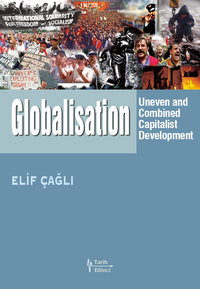When we examine the necessary conditions for a successful proletarian revolution as a whole, we must speak of three principal premises. The first one is related to the general conditions of production across the world. Productive forces must reach a certain level of development that would allow socialism to replace capitalism. Secondly, a class that possesses both the intention and capability to carry out such historical transformation must come into existence. That is to say, the position occupied by the working class in the economy must allow it to launch such a radical change. And thirdly, the working class must be prepared to carry out the revolution. While the first two conditions involve the objective basis for the overthrow of capitalism and the building of socialism, the last one corresponds to the subjective factor of the revolution. In order not to drift towards voluntarism or spontaneity on the question of revolution, one must properly grasp the objective and subjective factors of proletarian revolution.
The fact that the world as a whole has become ready for socialism, in other words, that the objective conditions are ripe for socialism, should not be taken to mean that proletarian revolution can be accomplished at any given time. This point was highlighted by Trotsky, who said that the revolutionary character of our epoch would not allow for the realisation of the revolution, that is, the seizure of power at any moment. As he put it, the revolutionary character of the epoch “consists in profound and sharp fluctuations and abrupt and frequent transitions from an immediately revolutionary situation; in other words, such as enables the communist party to strive for power, to a victory of the Fascist or semi-Fascist counter-revolution…”[1] Indeed, the revolution does not come up as a result of voluntary decisions of individuals. First and foremost, the objective conditions of revolution must be ripe. Therefore, one should not confuse the objective conditions enabling the socialist transformation of society with the objective conditions of the proletarian revolution. The objective condition of the revolution, that is, the revolutionary situation, cannot be a product of the will of individuals or organisations, and in the last instance, it is linked to crises into which capitalism plunges.
Lenin classifies the symptoms of a revolutionary situation into three general categories: “(1) when it is impossible for the ruling classes to maintain their rule without any change; when there is a crisis, in one form or another, among the «upper classes», a crisis in the policy of the ruling class, leading to a fissure through which the discontent and indignation of the oppressed classes burst forth. For a revolution to take place, it is usually insufficient for «the lower classes not to want» to live in the old way; it is also necessary that «the upper classes should be unable» to live in the old way; (2) when the suffering and want of the oppressed classes have grown more acute than usual; (3) when, as a consequence of the above causes, there is a considerable increase in the activity of the masses, who uncomplainingly allow themselves to be robbed in «peace time», but, in turbulent times, are drawn both by all the circumstances of the crisis and by the «upper classes» themselves into independent historical action.”[2]
Lenin calls these conditions “objective changes” and the totality of them a “revolutionary situation”. He emphasizes that without these objective changes, which are independent of the will, not only individual groups and parties but even individual classes are unable to carry out a revolution. However, even the rise of a revolutionary situation does not guarantee that a revolution will take place. Indeed, although such situations existed in Russia prior to the revolution of 1905, none of them ended in revolution. For, a revolution can only take place when a subjective change is present alongside above-mentioned objective changes. The working class must be able to take revolutionary mass actions strong enough to overthrow the government, which would never, not even in a period of crisis, fall spontaneously. In short, in order for a revolutionary situation to turn into a revolution that will overthrow the old government, the subjective factor must be ripe enough. In other words, there must be a correct leadership and the working class must have a sufficient level of political consciousness and organisation.
In the absence of a revolutionary situation, even the strongest organisation is not able to introduce the revolution solely on the basis of its own revolutionary activity. On the other hand, however, it should not be overlooked that, in the age of imperialism, capitalism frequently creates ferment that leads to revolutionary situations. And it is precisely for this reason that the subjective factor has become decisive historically. Therefore, the historical crisis of mankind can be reduced to the crisis of revolutionary leadership. As Trotsky pointed out, under today’s circumstances, the opportunist mindset that overlooks the role of the party and the revolutionary leadership poses a serious danger. He lays a strong emphasis on the fact that the key to the whole historical process has passed into the hands of the subjective factor, that is, the party. Opportunism, on the other hand, always tends to underestimate the role of the subjective factor, that is, the importance of the party and of revolutionary leadership. Hence, “Such an attitude, which is false in general, operates with positively fatal effect in the imperialist epoch.”[3]
For the forces preparing to take up the vanguard role in the revolutionary struggle of the proletariat, an accurate analysis of concrete situation bears utmost importance since the tactics will be determined accordingly. For instance, in the event of a revolutionary situation, it is extremely vital to determine and implement the tactics that will help spread the idea of overthrowing capitalism within the mass struggle and propel the struggle towards revolution. When the struggle reaches such a level of maturity that brings up the question of seizing the power as an urgent task, that is to say, in the stage of immediate revolution, it becomes essential to bring forward the tactics of insurrection in a courageous and wise way and make necessary preparations accordingly. But, to avoid misunderstanding, we must highlight that there is no rigid wall between a revolutionary situation and a revolution. Therefore, one must avoid scholastic ways of reasoning while examining the relationship between these two different levels of maturity in terms of the development of revolutionary struggle. In a revolutionary situation, the task of the vanguard forces of the working class is to make the utmost progress possible in preparation for the revolution, without wasting time in vain discussions such as “is it a revolutionary situation or a revolution?” It must be kept in mind that, in the absence of the necessary leadership, a revolutionary situation can easily recede, just as it can be propelled towards a successful revolution with the efforts of the revolutionary vanguard. Hence, in such critical situations, this is the basic reality that defines the focal point.
[1] Trotsky, The Third International After Lenin, p.81-82
[2] Lenin, “The Collapse of the Second International”, CW, Vol.21, p.213-214
[3] Trotsky, The Third International After Lenin, p.84
link: entkom_admin, Objective and Subjective Conditions of Revolution, 2 November 2003, https://enternasyonalizm.org/node/544
Reformism Refreshes Capitalism
Referendum Result is Illegitimate! Keep on Fighting!






